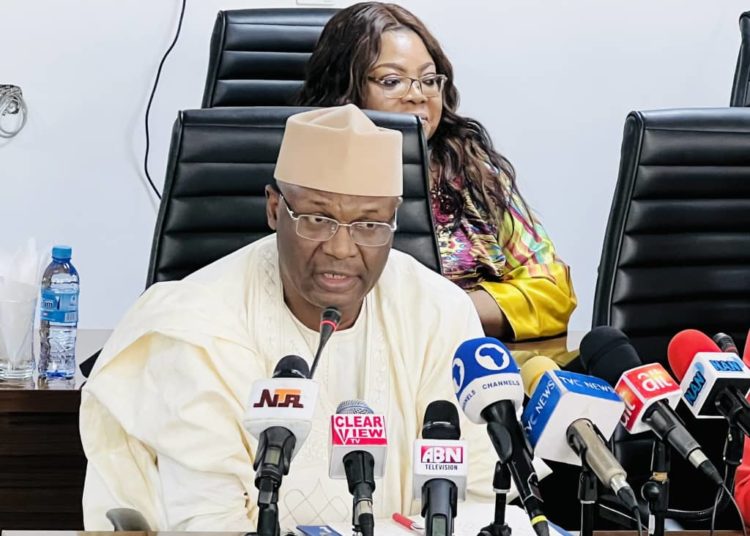The introduction of Bimodal Voter Accreditation System (BVAS) by the Independent National Electoral Commission (INEC) is a positive game changer!
BVAS which was deployed both in Ekiti and Osun states governorship elections, is one of the best innovations to our electoral processes in recent times.
Already INEC has declared that it will deploy over 200,000 BVAS across the country for the 2023 general election. If INEC goes ahead with this plan and sincerely executes the elections with BVAS modality, then, Nigeria is likely to have one of the most transparent elections this 2023. INEC deserves commendation for this introduction of BVAS.
Similarly, President Muhammadu Buhari should be thanked for signing into law the 2022 Electoral Act which allows the use of BVAS and other superior tamper resistant electronic devices for elections. Also, the civil society organisations and others who mounted pressure on Buhari to sign the 2022 Electoral Act when he was prevaricating in signing it into law, deserve plaudits.
If properly deployed BVAS will eliminate many of the electoral malpractices hindering the conduct of transparent elections in Nigeria. With BVAS there will be no manual accreditation of voters or incident forms, as the right to vote depends on electronic accreditation using the voter’s finger print or face imprint. The crisis that usually arises through incident forms and excess voting will be eliminated. There will be no need for ballot snatching because that would be a waste of time. The election results would be announced at the polling units at the end of voting and transmitted right from there to the INEC server which is monitored by candidates, party stakeholders, CSOs and INEC from various Situation Rooms. There will be no room for change of figures at the local government or state collation centres. Collation centres will be mere academic funneling points unlike in the past where it used to be the centres of election results manipulation and vote stealing.
This has given hope to Nigerians and many believed that it has motivated many Nigerians to register to vote in 2023 with the expectation that with BVAS their votes are likely to count.
You can therefore imagine the surprise of Nigerians when recently the media was awash with the story that INEC will still embark on manual collation of results in 2023 general election.
The confusion started when INEC’s National Commissioner in charge of Information and Voter Education, Mr Festus Okoye, reportedly said the collation of results of the 2023 general elections will be done manually despite the adoption of electronic transmission of results.
He stressed that the commission would transmit results from polling units to its result-viewing portal (IReV), as witnessed in recent offseason elections, but explained that the Electoral Act was clear on how collation should be done.
“There is a marked difference between the transfer/transmission of results and the collation of results. Section 50(2) of the Electoral Act, 2022 gives the commission the absolute discretion to determine the mode and procedure of voting in an election and the transmission of election results,” Okoye said.
“Sections 60 and 62 of the Electoral Act govern post-election procedure and collation of election results. Section 60(1) of the Act provides that the presiding officer shall, after counting the votes at a polling unit, enter the votes scored by each candidate in a form to be prescribed by the commission.
“Section 60(5) of the Act makes it mandatory that the presiding officer shall transfer the results, including total number of accredited voters and the results of the ballot in a manner prescribed by the commission. Thereafter, the presiding officer shall after recording and announcing the results deliver the same along with election materials under security and accompanied by the candidates or their polling agents, where available to such person as may be prescribed by the commission.
“The implication of this is that the collation process of results is still essentially manual, but the collation officer must collate subject to his verification and confirmation that the number of accredited voters stated on the collated result are correct and consistent with the number of accredited voters recorded and transmitted directly from polling units”.
He said that while the collation of results would essentially be done manually, where there was a dispute regarding a collated result or the result from any polling unit, the collation or returning officer would use the original of the disputed collated result, accreditation data from the Bimodal Voter Accreditation System (BVAS) device and the results transmitted directly from the polling unit to determine the correctness of the result. Nigerians reacted angrily on social media and elsewhere to the statement by Okoye. The heat was such that the electoral body on Sunday issued a statement explaining that it was quoted out of context and insisted that electronic voting and transmission of votes remains sacrosanct. It said in a statement by the same Festus Okoye that it would continue to adopt electronic transmission of results for the 2023 general elections. Okoye said that his comment previously was misinterpreted insisting that the electronic transmission of results adopted in the recent off-season governorship elections has come to stay.
“We wish to reassure Nigerians that the electronic transmission of results has come to stay. It adds to the credibility and transparency of the process when citizens follow polling unit-level results on the INEC Result Viewing (IReV) portal in real-time on Election Day. There will be no change or deviation in subsequent elections. “The entire gamut of result management is provided for in Sections 60, 62 and 64 of the Electoral Act 2022. In line with the provision of the law, the Commission, in April this year, released a detailed clarification of the procedure for transmission, collation and declaration of result which was shared with all stakeholders and uploaded to our website,” he said.
Now that it is settled that BVAS will be at the centre stage of 2023 general elections it is important to examine how prepared the voters are to participate in the process and vote from informed positions of knowledge.
How informed are the citizenship? Do they understand the importance of democracy and the supremacy of their votes in an election? Many Nigerians still do not know that democracy is the right of the people to elect their leaders and this can only be possible through transparent electoral processes devoid of danger, fear or extortion.
Certainly, there is a marked difference between election and an auction!
An auction is what happens when the votes are bought and victory goes to the highest bidder. That is one of the threats to our elections which BVAS may not be able to eradicate. Vote buying or auctioning is not election in the real sense of it. Election is when people cast votes based on information and what they believe the candidates will be able to do for them and not votes cast as a result of financial inducements. Therefore, voter education and enlightenment are key to successful democracy!
Well informed voters tend to vote on issues while the uninformed vote on basis of ethnicity, religion etc , instead of capacity of the candidates.
As the economy of the country is now in dire straits and inflation has reached the highest in 19 years, everyone is feeling the heat including Muslims, Christians, Animists, Hausa, Fulani, Igbo, Yoruba and other ethnic groups. There is therefore the need for all voters to understand that a vote cast for the wrong reasons will ensure another term of economic difficulty for all irrespective of religion and ethnicity! There is therefore the need for intensive voter education by the INEC, political parties, non-governmental organisations, candidates of political parties, National Orientation Agency (NOA), and faith-based organisations so that we can have voters that can make issue-based voting decisions during the 2023 general election.
MAY NIGERIA REBOUND





